Explore the Depths of Personality
OCEANS Personality Navigator
The OCEANS Personality Navigator is a scientifically-grounded psychometric tool designed to assess and understand workplace personality. Built on the widely respected Five Factor Model, OCEANS goes a step further by adding a sixth dimension "Sincerity", providing organizations and individuals with deeper insight into how personality influences performance, behavior, and potential.
explore the deapths of personality
OCEANS Personality Navigator
The OCEANS Personality Navigator is a scientifically-grounded psychometric tool designed to assess and understand workplace personality. Built on the widely respected Five Factor Model, OCEANS goes a step further by adding a sixth dimension — Sincerity — to give organizations and individuals a fuller picture of how personality influences performance, behavior, and potential.
explore the deapths of personality
OCEANS Personality Navigator
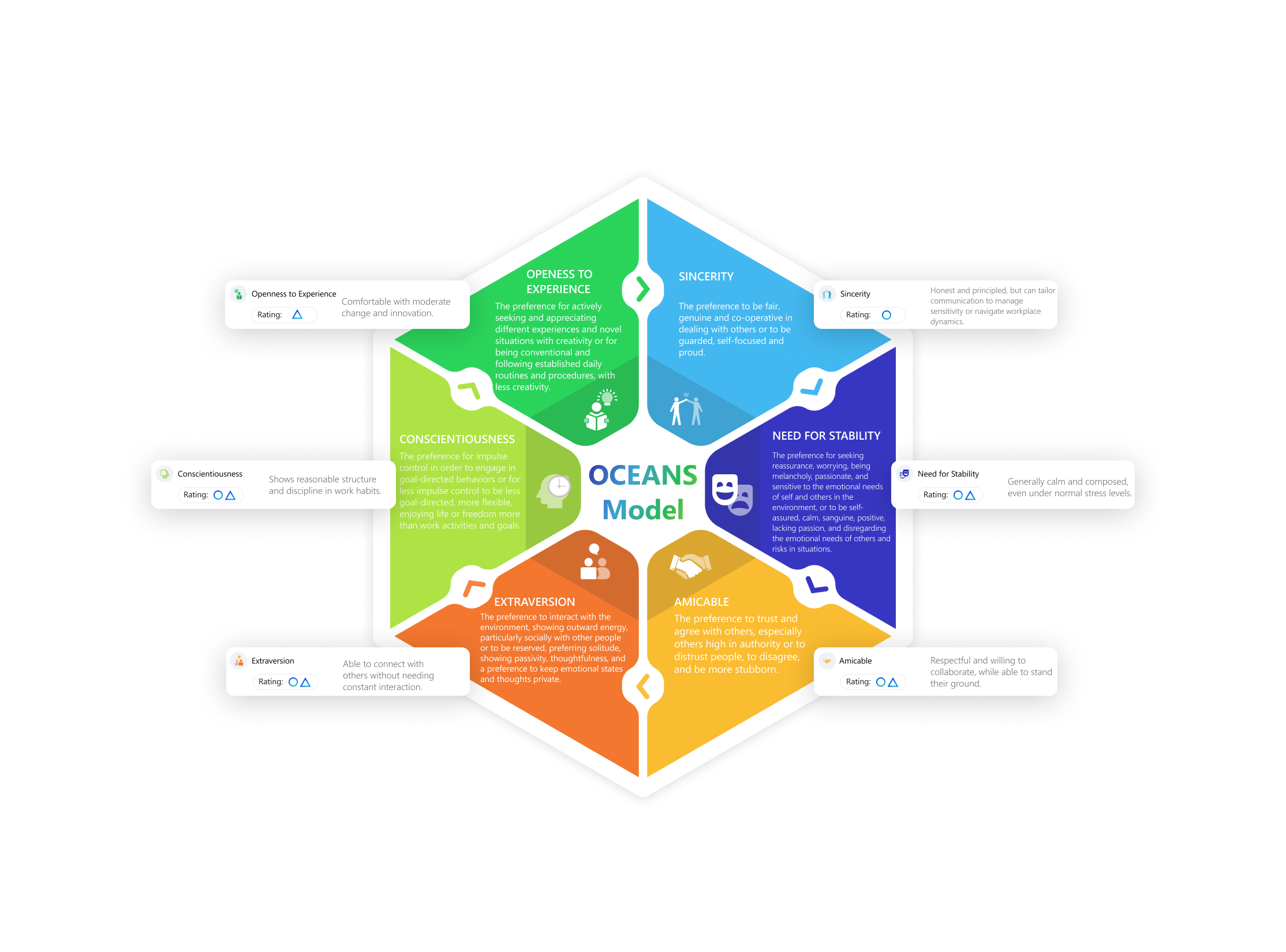
The OCEANS Personality Navigator is a scientifically-grounded psychometric tool designed to assess and understand workplace personality. Built on the widely respected Five Factor Model, OCEANS goes a step further by adding a sixth dimension Sincerity to give organizations and individuals a fuller picture of how personality influences performance, behavior, and potential.
-
REAL IMPACT
Understanding personalities isn’t just about people; it’s about unlocking performance, aligning teams, and accelerating business results
Improved Team Performance
Aligning team roles and communication styles with personality profiles enables smoother collaboration and reduces conflict.
Better Hiring & Role Fit
Matching candidates’ OCEANS profiles to role requirements ensures stronger cultural fit and long-term success.
Enhanced Leadership Development
Personality insights identify leadership styles, surface development needs, and support early coaching interventions.
OCEANS Personality Key Features
Empower workforce decisions with data-driven assessments that reveal potential and align strengths with roles.
Balanced Scale
A balanced, judgment-free scale — no percentiles, no "High/Low/Average" labels. Because people aren’t numbers.
Dashboard
View personality, strengths, and growth areas in one unified dashboard. Track progress and take action with clarity.
Interactive Feedback
Interactive, easy-to-digest feedback across all personality factors and facets.
Sincerity Factor
Includes the essential sixth factor "Sincerity" for a more complete personality profile.
Strengths Aligned to Reputation
Understand how your strengths influence how others perceive and experience you.
Development Plan
Personalized development insights highlighting your key growth pathways.
OCEANS Personality Navigator Dashboard
Empower decision-making with data-driven talent insights that unlock potential and align strengths with roles.
Main Dashboard
Openness to Experience
Conscientiousness
Extraversion
Amicable
Need for Stability
Sincerity
Main Dashboard
Your central performance hub — displaying achievements, growth areas, and progress toward personal and organizational goals in one clear view.
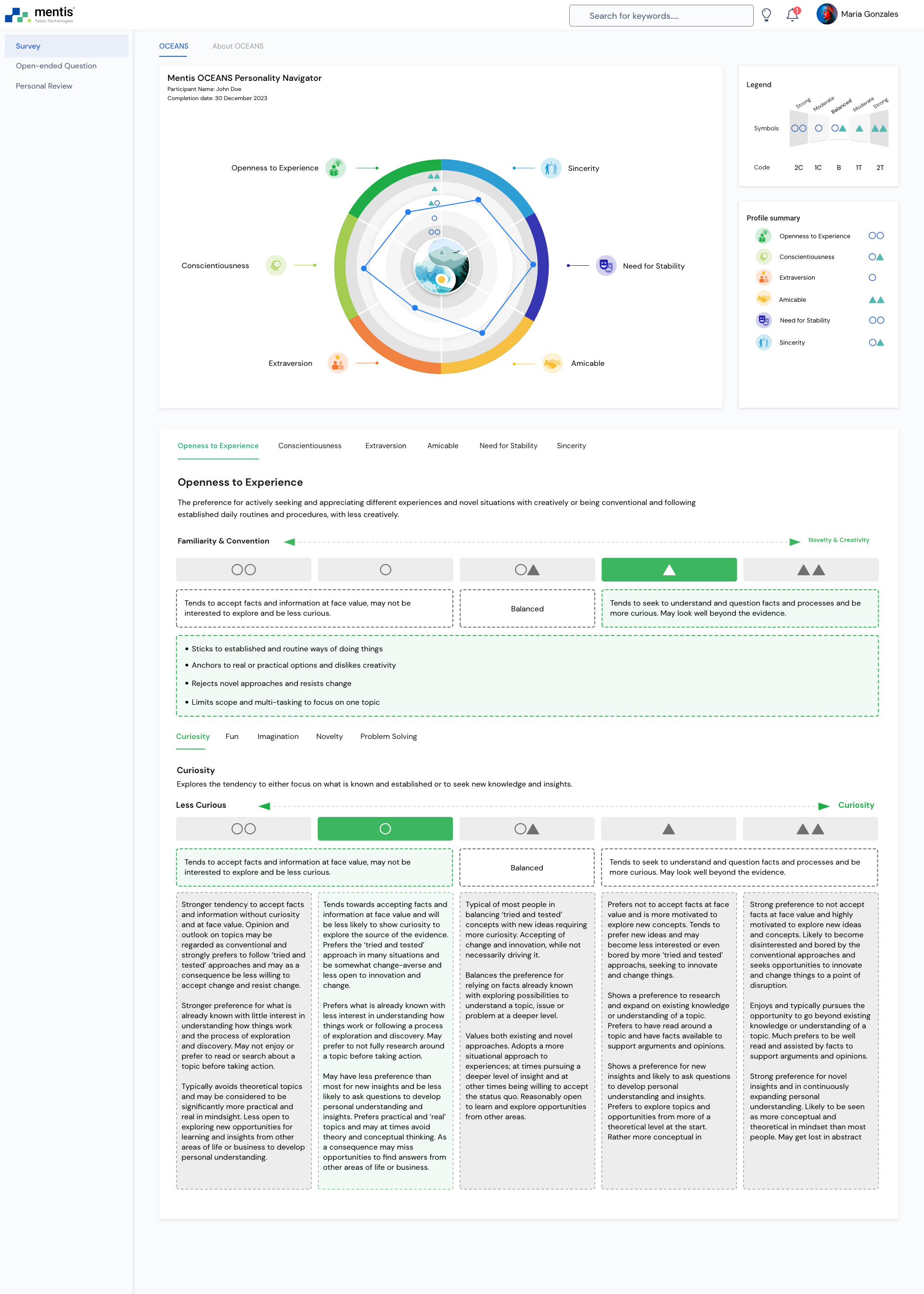
Conscientiousness
Reflects discipline, organization, and reliability — a key indicator of consistency, accountability, and achievement.
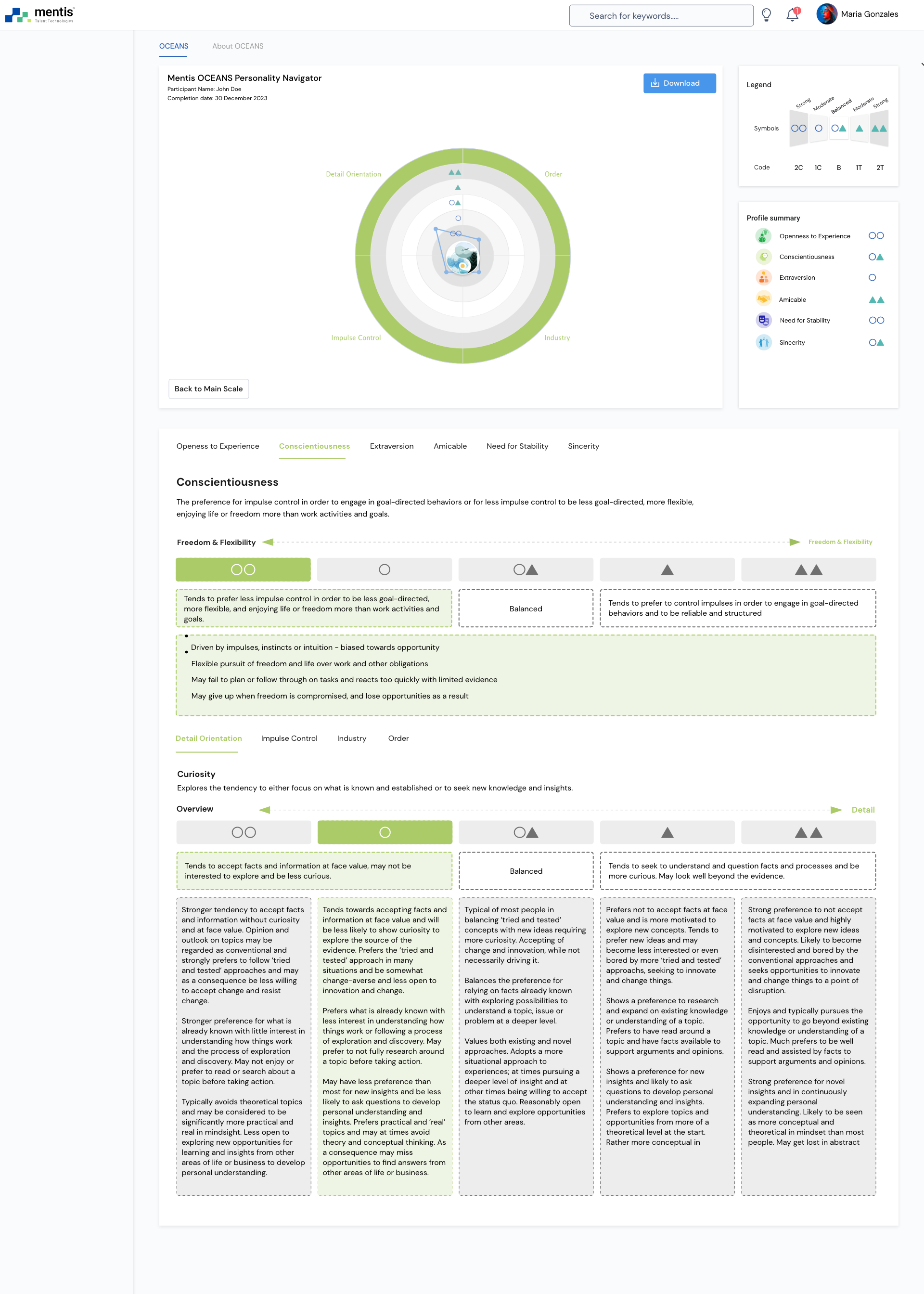
Extraversion
Highlights your energy, collaboration style, and engagement with others — showing how you influence group dynamics and team culture.
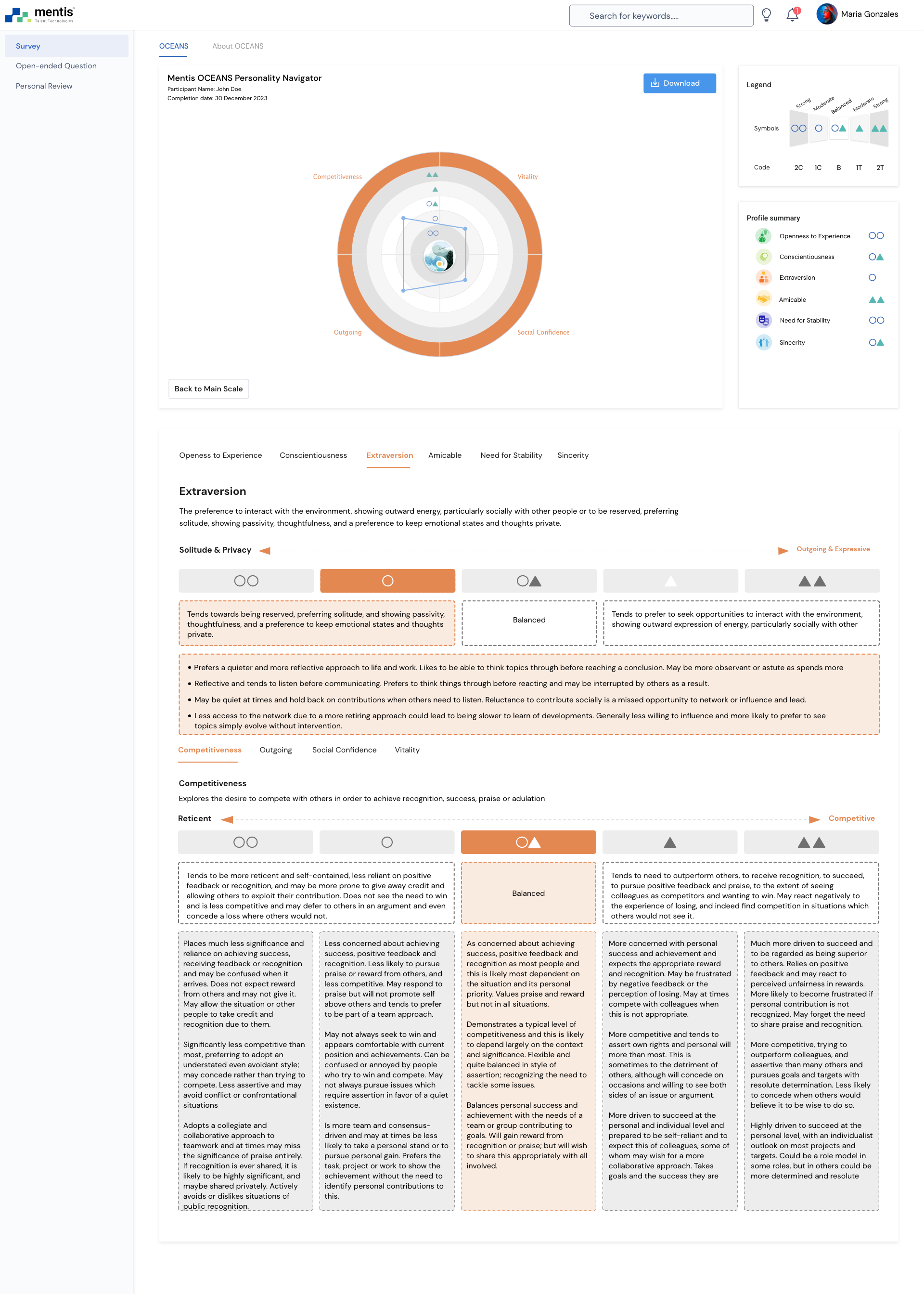
Amicable
Assesses empathy, cooperation, and conflict resolution — demonstrating how well you build trust and maintain positive relationships.
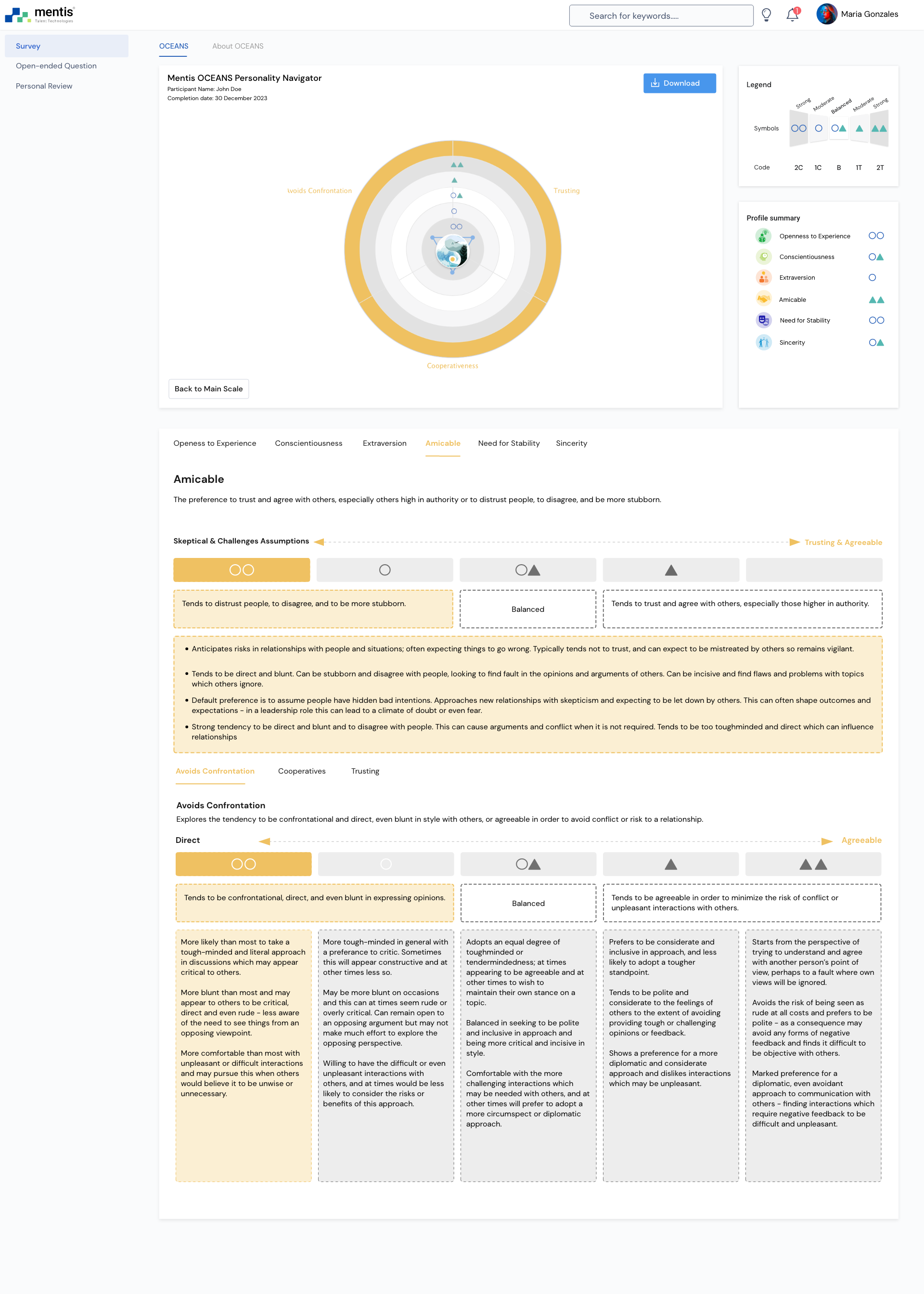
Need for Stability
Measures resilience and emotional regulation — revealing how you respond to stress, uncertainty, and change.
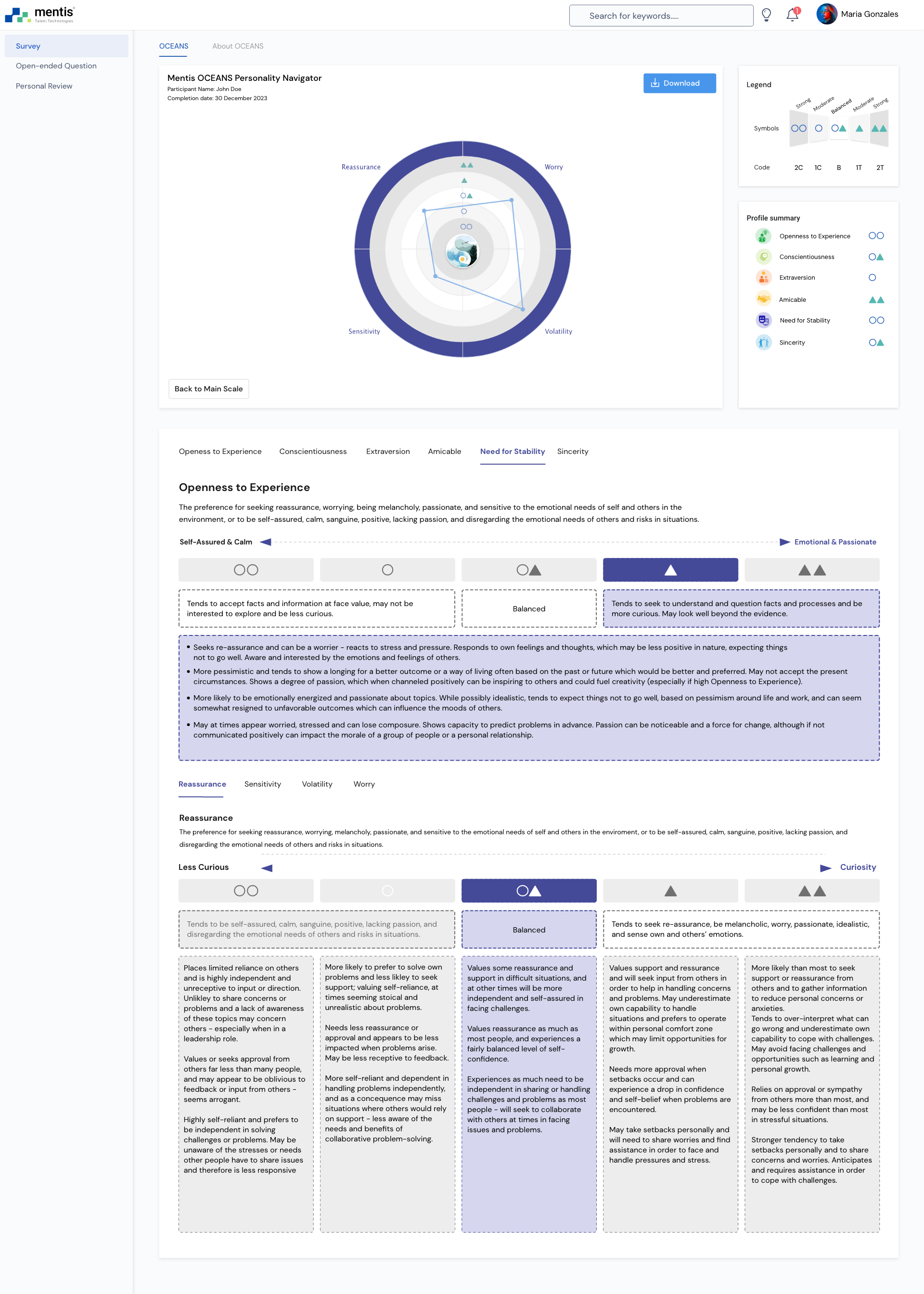
Sincerity
Demonstrates authenticity, transparency, and ethical integrity — building credibility through consistent and honest behavior.
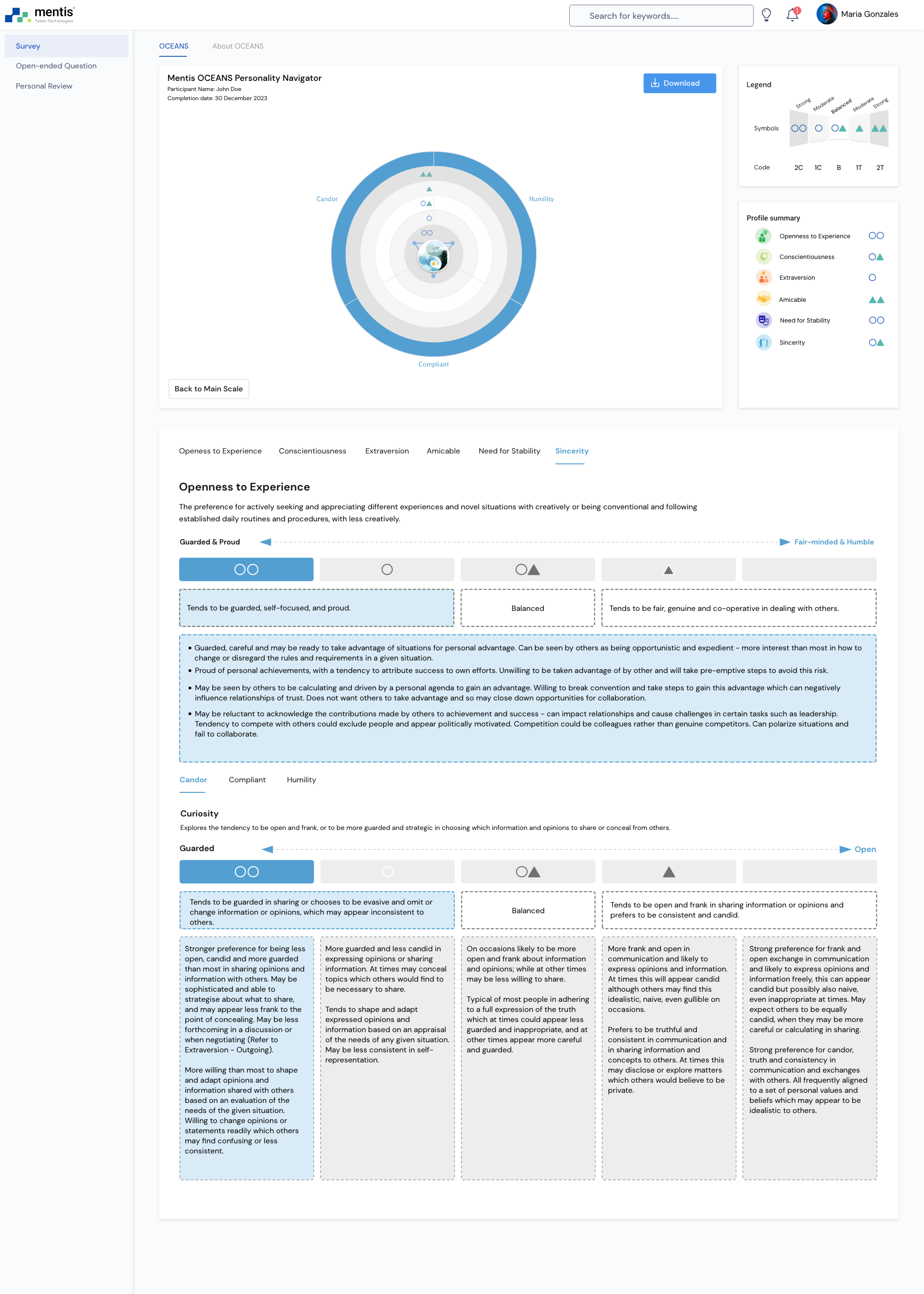
Openness to Experience
Measures curiosity, creativity, and adaptability — revealing how you embrace new ideas, innovation, and diverse perspectives.
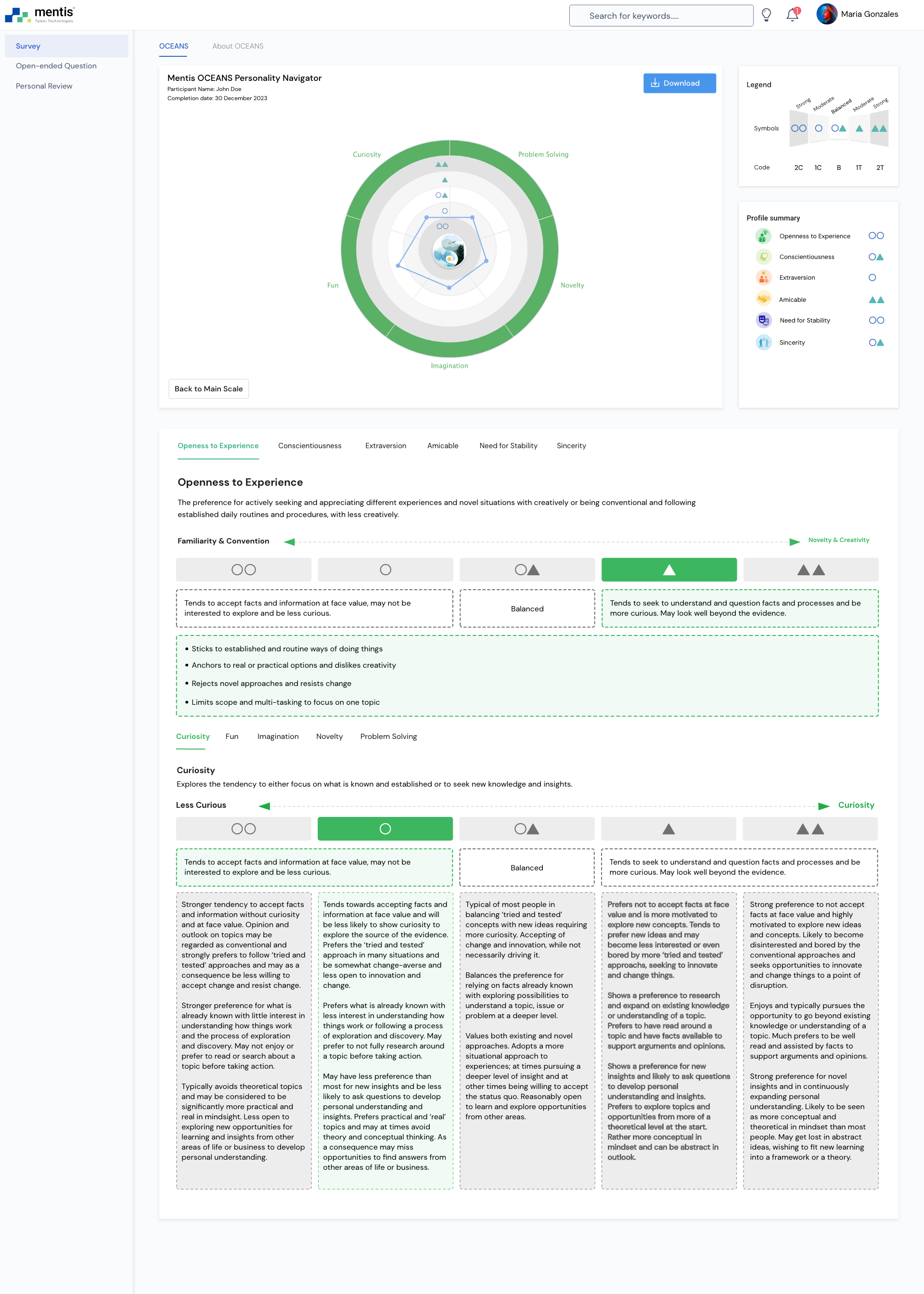
Download a
sample report
Discover the depth of insights and actionable analysis included in our full assessment reports.
Enter your email to receive your copy instantly.
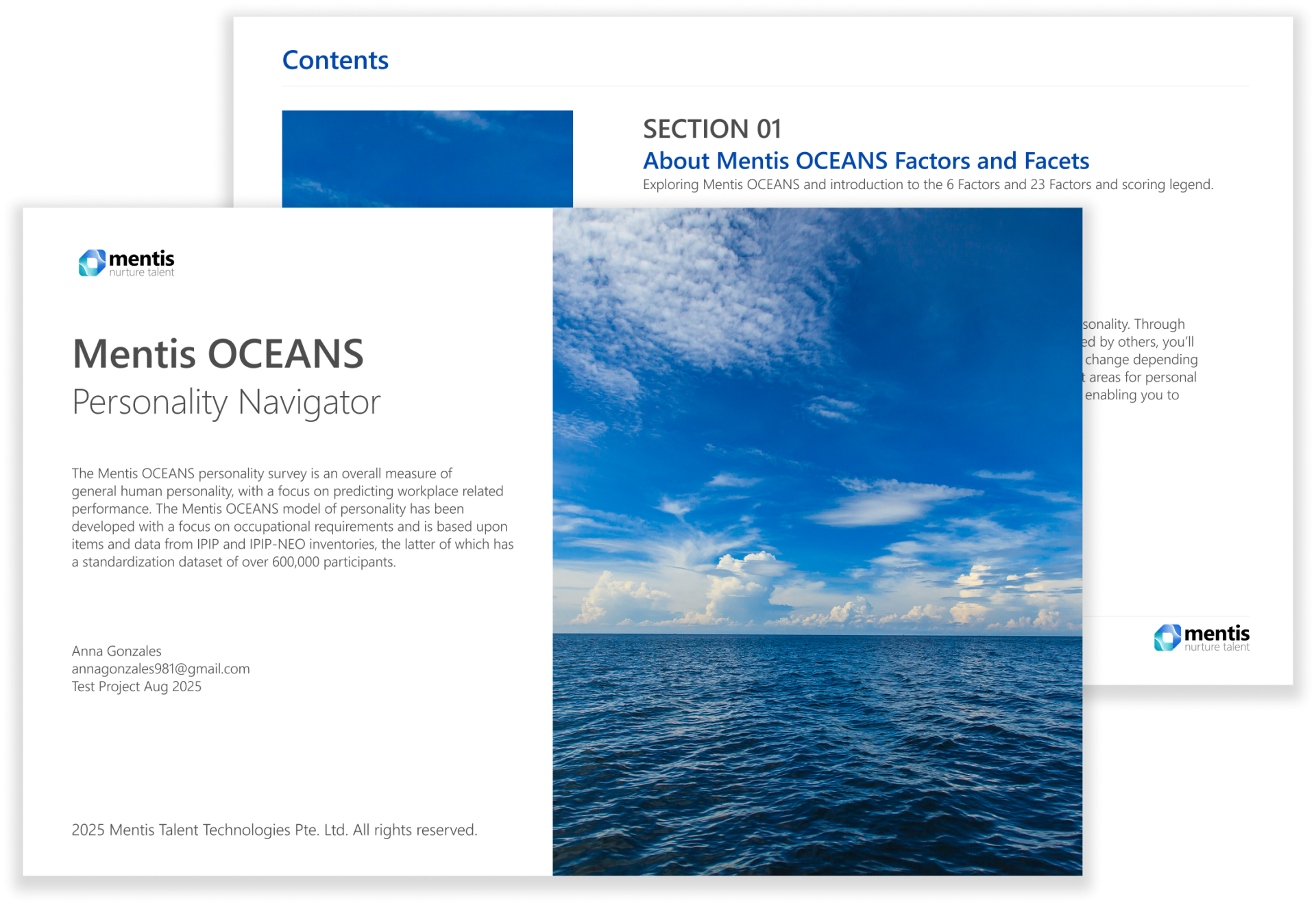
OCEANS Personality
Mentis OCEANS Personality Navigator Factors and Facets
OCEANS consists of 6 Factors comprising 24 Facets – providing more specific insights
Openness to Experience
The preference for actively seeking and appreciating different experiences and novel situations with creativity or for being conventional and following established daily routines and procedures, with less creativity.
Curiosity
Explores the tendency to either focus on what is known and established or to seek new knowledge and insights.
Fun
Explores the tendency to either be serious or to be fun and open to seeing the humor in situations.
Imagination
Explores the tendency to be real, focused on what is evident now, or to use imagination, look for ideas and ‘day-dream’.
Novelty
Explores the tendency to prefer to stick to a set routine and be conventional, or seek variety and find enjoyment in new and unusual situations and activities.
Problem Solving
Explores the tendency to avoid complex data, trends and problems or to explore issues and challenges more comprehensively, influencing choices and decisions.
While this facet is not a measure of problem-solving accuracy and IQ – this examines preferences for types of tasks and information and the tenacity to pursue asolution.
While this facet is not a measure of problem-solving accuracy and IQ – this examines preferences for types of tasks and information and the tenacity to pursue asolution.
Conscientiousness
The preference for impulse control in order to engage in goal-directed behaviors or for less impulse control to be less goal-directed, more flexible, enjoying life or freedom more than work activities and goals.
Order
Explores the tendency to either focus on what is known and established or to seek new knowledge and insights.
Detail Orientation
Explores the tendency to either be serious or to be fun and open to seeing the humor in situations.
Industry
Explores the tendency to either focus on what is known and established or to seek new knowledge and insights.
Impulse Control
Explores the tendency to either be serious or to be fun and open to seeing the humor in situations.
Extraversion
The preference for actively seeking and appreciating different experiences and novel situations with creativity or for being conventional and following established daily routines and procedures, with less creativity.
Vitality
Explores energy and enthusiasm for novel experiences and thrilling activities, or a desire to preserve energy, enjoy quietness, tranquility and a predictable existence.
Social Confidence
Explores confidence in public speaking, social situations and meeting new people through to having less confidence, preferring a more reserved approach; maintaining distance from people.
Competitiveness
Explores the desire to compete with others in order to achieve recognition, success, praise or adulation for being superior or, by contrast, a reticent approach, more self contained – less comfortable with feedback and attention. [This is not necessarily related to drive and motivation – see Industry].
Outgoing
Explores preference for social occasions and activities or spending time with a few, familiar people or alone.
Amicable
The preference for actively seeking and appreciating different experiences and novel situations with creativity or for being conventional and following established daily routines and procedures, with less creativity.
Trusting
Explores the tendency to be more wary about others’ motives and suspicious, or forgiving and trusting to maintain a cordial relationship.
Co-operativeness
Explores the preference to be more stubborn and argumentative with others, or make concessions in order to placate people and situations, possibly to the level of self-sacrifice.
Avoids Confrontation
Explores the tendency to be confrontational and direct, even blunt in style with others, or agreeable in order to avoid conflict or risk to a relationship.
Need for Stability
The preference for actively seeking and appreciating different experiences and novel situations with creativity or for being conventional and following established daily routines and procedures, with less creativity.
Reassurance
The preference for seeking reassurance, worrying, melancholy, passionate, and sensitive to the emotional needs of self and others in the environment, or to be self-assured, calm, sanguine, positive, lacking passion, and disregarding the emotional needs of others and risks in situations.
Sensitivity
Explores the tendency to be less aware or sensitive to the emotional needs of others or to be empathic and concerned to consider and respond to the feelings of people.
Volatility
Explores the degree of emotional reactivity – ranging from being less likely to express feelings and emotions, to being more emotionally expressive and prone to experiencing highs and lows in moods.
Worry
Explores the tendency to be less preoccupied by concerns or worries and to be more optimistic, or to be concerned and worry about risks and negative events.
Sincerity
The preference for actively seeking and appreciating different experiences and novel situations with creativity or for being conventional and following established daily routines and procedures, with less creativity.
Candor
Explores the tendency to be open and frank, or to be more guarded and strategic in choosing which information and opinions to share or conceal from others.
Humility
Explores the tendency to be modest and averse to being prideful, or to seek recognition, to overestimate personal capabilities and contributions to success.
Compliant
Explores the tendency to uphold moral standards and be fair and consistent in dealings with others, or to place self interest and needs above others and be willing to be flexible about following social norms and obligations.
EXPLORE SPATIAL AUDIO
Case Studies
See how brands use talent evaluation to craft insightful, unforgettable guest experience.

Talent evaluation is the process of assessing individuals to determine their abilities, potential, performance, and fit for a particular role, team, or organization. It’s a critical function in talent management and is often used in hiring, promotions, leadership development, succession planning, and team building.
Empty space, drag to resize

Talent evaluation is the process of assessing individuals to determine their abilities, potential, performance, and fit for a particular role, team, or organization. It’s a critical function in talent management and is often used in hiring, promotions, leadership development, succession planning, and team building.
Empty space, drag to resize

Talent evaluation is the process of assessing individuals to determine their abilities, potential, performance, and fit for a particular role, team, or organization. It’s a critical function in talent management and is often used in hiring, promotions, leadership development, succession planning, and team building.
Empty space, drag to resize

Talent evaluation is the process of assessing individuals to determine their abilities, potential, performance, and fit for a particular role, team, or organization. It’s a critical function in talent management and is often used in hiring, promotions, leadership development, succession planning, and team building.
Empty space, drag to resize

Talent evaluation is the process of assessing individuals to determine their abilities, potential, performance, and fit for a particular role, team, or organization. It’s a critical function in talent management and is often used in hiring, promotions, leadership development, succession planning, and team building.
Empty space, drag to resize

Navigate your personality
Learn all about OCEANS Personality Profiling!
Contact us to arrange a review and discussion to introduce this person-centered, ground-breaking product. We also run occasional certification courses.
TALENT EVALUATION
Case Studies
Se how brands use talent evaluation to craft insightful, unforgettable guest experience.
Talent evaluation is the process of assessing individuals to determine their abilities, potential, performance, and fit for a particular role, team, or organization. It’s a critical function in talent management and is often used in hiring, promotions, leadership development, succession planning, and team building.
Empty space, drag to resize

Talent evaluation is the process of assessing individuals to determine their abilities, potential, performance, and fit for a particular role, team, or organization. It’s a critical function in talent management and is often used in hiring, promotions, leadership development, succession planning, and team building.
Empty space, drag to resize

Talent evaluation is the process of assessing individuals to determine their abilities, potential, performance, and fit for a particular role, team, or organization. It’s a critical function in talent management and is often used in hiring, promotions, leadership development, succession planning, and team building.
Empty space, drag to resize

Talent evaluation is the process of assessing individuals to determine their abilities, potential, performance, and fit for a particular role, team, or organization. It’s a critical function in talent management and is often used in hiring, promotions, leadership development, succession planning, and team building.
Empty space, drag to resize

Talent evaluation is the process of assessing individuals to determine their abilities, potential, performance, and fit for a particular role, team, or organization. It’s a critical function in talent management and is often used in hiring, promotions, leadership development, succession planning, and team building.
Empty space, drag to resize

Frequently Asked Questions
What is Mentis OCEANS and what does it provide?
OCEANS is a personality survey developed by Mentis using the International Personality Item Pool (IPIP) that explores an individual’s consistent patterns of attitudes, preferences to identify style of behavior and interaction. The profile report gives insights into strengths and areas for improvement. OCEANS can be used for team and individual development and to guide people in career decisions.
What is the origin of Mentis OCEANS?
Mentis OCEANS has been built on the foundations of highly standardised and validated models of personality which are widely regarded to be the most robust empirical frameworks of personality. Mentis OCEANS is designed to be contextually relevant, meaning it has been aligned with organisational needs. Items in Mentis OCEANS have been developed from the International Personality Item Pool (IPIP), which is an open resource containing over 3000 personality items measuring a wide variety of constructs. More than one thousand researched studies have been published using IPIP across cultures and the widest range of occupations.
How long does it take to complete?
For the standard version participants need to allow between 35-45 minutes to complete the survey. We plan to release a short version of OCEANS soon.
What does the set-up process involve; how simple is it?
Dedicated administrator access is provided to you and our customer success team will work closely with you to show you how to use the intuitive system for setting up projects and inviting participants through automated emails. Participants complete a simple profile and then complete the survey online and the output is automatically generated. The dashboard profile and pdf report is available immediately through the Navigator™ system.
How long do Mentis OCEANS reports take to generate?
Once a participant has completed Mentis OCEANS, results are automatically available to view in the dashboard of Navigator™.
What languages is it available in?
OCEANS is available in English, but is currently being translated into major languages including Simplified and Traditional Chinese, Thai and Arabic.
What advantages does OCEANS offer compared to other personality assessments?
Mentis OCEANS adopts a modern and non-judgmental philosophy applying a dialectic approach which considers all aspects of each dimension as being integrated. This means that we avoid Western bias in interpretation and all profiles are considered equal. We believe that applying numerical values naturally leads to assumptions such as “high is good, low is bad”. Our two decades of experience with personality profiling encouraged us to abandon outdated concepts such as percentiles, Sten scores as these confuse and demotivate people.
OCEANS includes a sixth factor that many other personality tools overlook, and items are formed from reliable and widely validated sources. Here at Mentis, we have over 20 years of implementing personality assessments for our client’s success across organisations and cultures.
OCEANS includes a sixth factor that many other personality tools overlook, and items are formed from reliable and widely validated sources. Here at Mentis, we have over 20 years of implementing personality assessments for our client’s success across organisations and cultures.
What does benchmarking mean?
Benchmarking refers to the practice of evaluating a model by testing its predictive performance in tasks that represent the purpose they are developed for against other models or tools
What is the IPIP?
The International Personality Item Pool (IPIP) is an online open database of personality items that OCEANS items have been developed from
Why are we measuring the mentioned 6 specific constructs?
The 6 factors in OCEANS are aligned with the Five Factor Model that is one of the most widely researched and robust empirical frameworks of personality. The FFM suggests personality can be classified based on five broad dimensions (emotional stability, extraversion, agreeableness, conscientiousness and openness to experience). OCEANS has contextually amended and reconfigured this to make it relevant to an organisational culture and to address existing gaps in personality models such as the FFM.
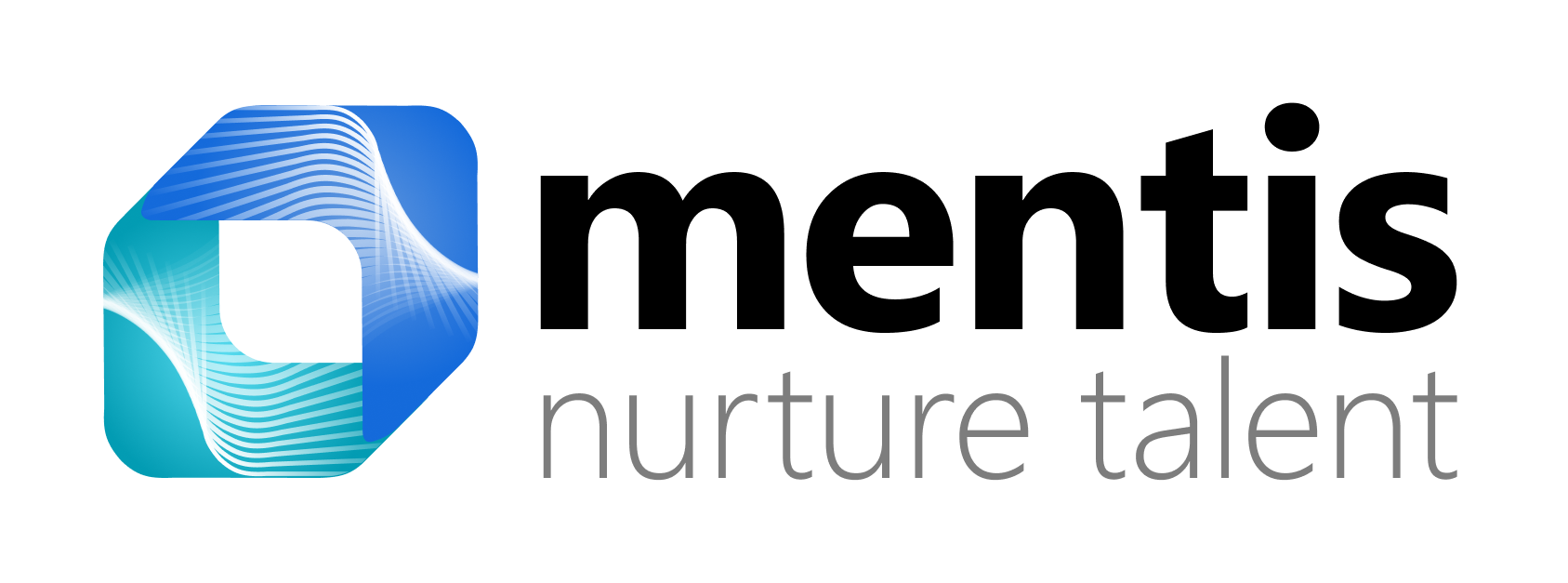
Empty space, drag to resize
Stay Updated on Talent Innovation, Events & Product Launches
By providing this information, you agree that we may process your personal data in accordance with our Privacy Statement.
-
Resources
-
Insights
-
Partners
-
Success Stories
Request a demo
By providing this information, you agree that we may process your personal data in accordance with our Privacy Statement.
Richard Brady is the Founder & Executive Chairman of Mentis Talent Technologies, a Singapore‑headquartered HR EdTech company operating across EMEA and Asia-Pac. He has devoted 35 years to building high‑impact, evidence‑based approaches to talent evaluation, insight, and learning. Richard established Mentis in 2003 with a simple premise: organizations thrive when they nurture talent, not just measure it. Today, that ethos is embodied in the Mentis Navigator ecosystem: OCEANS Personality Navigator, Competency Navigator 90/180/360-degree feedback, SONAR Network Centrality, and the BRAVO Social‑Emotional Compass, providing a coherent, data‑rich pathway from insight to action.
Richard’s client work spans the public and private sectors across the GCC and ASEAN. He has designed and led multi‑method leadership programs, combining competency‑based interviews, multi‑source feedback, business simulations, and Hogan personality & reasoning assessment. Mentis programs emphasize measurable business outcomes, capability uplift, and the creation of collaborative learning cohorts supported by mentoring and feedback. Mentis has supported hundreds of multinational companies, NGOs, and regional entities in the GCC with talent evaluation and development programs.
Richard is a trained and certified coach, Situational Leadership® certified practitioner and highly experienced coach and mentor for specialists and leadership navigating career transitions and promotions.
A Chartered Occupational Psychologist (HCPC‑registered; BPS Chartered), Richard has trained and certified thousands of practitioners in personality assessment and evidence‑based talent practices. He is Hogan‑certified (HPI, HDS, MVPI; advanced interpretation) and experienced facilitator multisource feedback. He has partnered as adjunct faculty or facilitator with leading business schools including London Business School, Oxford Saïd, IMD, and Thunderbird.
Richard’s academic work focuses on psychological flexibility (ACT/fACT) and social‑emotional learning at work. As a doctoral researcher at Goldsmiths, University of London (Institute of Management Studies), he is conducting mixed‑methods research exploring how psychological flexibility relates to quality of working life, values‑based action, and leadership development, integrating RCTs, systematic reviews (PRISMA‑aligned). These insights inform Mentis Navigator product design and coaching‑at‑scale methodologies.
Beyond assessment, Richard champions competency development as an organizational capability. He designs journeys that help leaders optimize strengths and neutralize derailers, blending focused practice, mentoring feedback, and network‑centric development through SONAR. His coaching draws on Acceptance & Commitment Training (fACT), compassion‑focused approaches, and solution‑focused models aligned to EMCC/ICF standards, translating science into practical behavior change.
Richard divides his time between product strategy, client advisory, and research, with a growing emphasis on thought leadership and practitioner accreditation through Mentis Academy. He is committed to building an inclusive, data‑literate coaching community across ASEAN and the GCC and to advancing prosocial, values‑based leadershi true to the Mentis promise: Nurture Talent™.
Richard’s client work spans the public and private sectors across the GCC and ASEAN. He has designed and led multi‑method leadership programs, combining competency‑based interviews, multi‑source feedback, business simulations, and Hogan personality & reasoning assessment. Mentis programs emphasize measurable business outcomes, capability uplift, and the creation of collaborative learning cohorts supported by mentoring and feedback. Mentis has supported hundreds of multinational companies, NGOs, and regional entities in the GCC with talent evaluation and development programs.
Richard is a trained and certified coach, Situational Leadership® certified practitioner and highly experienced coach and mentor for specialists and leadership navigating career transitions and promotions.
A Chartered Occupational Psychologist (HCPC‑registered; BPS Chartered), Richard has trained and certified thousands of practitioners in personality assessment and evidence‑based talent practices. He is Hogan‑certified (HPI, HDS, MVPI; advanced interpretation) and experienced facilitator multisource feedback. He has partnered as adjunct faculty or facilitator with leading business schools including London Business School, Oxford Saïd, IMD, and Thunderbird.
Richard’s academic work focuses on psychological flexibility (ACT/fACT) and social‑emotional learning at work. As a doctoral researcher at Goldsmiths, University of London (Institute of Management Studies), he is conducting mixed‑methods research exploring how psychological flexibility relates to quality of working life, values‑based action, and leadership development, integrating RCTs, systematic reviews (PRISMA‑aligned). These insights inform Mentis Navigator product design and coaching‑at‑scale methodologies.
Beyond assessment, Richard champions competency development as an organizational capability. He designs journeys that help leaders optimize strengths and neutralize derailers, blending focused practice, mentoring feedback, and network‑centric development through SONAR. His coaching draws on Acceptance & Commitment Training (fACT), compassion‑focused approaches, and solution‑focused models aligned to EMCC/ICF standards, translating science into practical behavior change.
Richard divides his time between product strategy, client advisory, and research, with a growing emphasis on thought leadership and practitioner accreditation through Mentis Academy. He is committed to building an inclusive, data‑literate coaching community across ASEAN and the GCC and to advancing prosocial, values‑based leadershi true to the Mentis promise: Nurture Talent™.
Professional Profile
Founder & Executive Chairman, Mentis Talent Technologies (since 2003) - Executive Coach & Program Architect (lead evaluator, assessor, and mentor) - Researcher (Goldsmiths, University of London).
What I Do - Design and lead multi‑method leadership evaluation & development programs - Build data‑rich learning journeys that integrate assessment, mentoring, and practice - Advise boards and CHROs on successor pipelines, capability models, and cohort scaling
Domains - Talent Evaluation & Insight • Competency Frameworks • Multi‑source Feedback (90/180/360) • Business Simulations • Personality & Reasoning Assessment • Social‑Emotional Learning • Network‑centric Development • Coaching at Scale
What I Do - Design and lead multi‑method leadership evaluation & development programs - Build data‑rich learning journeys that integrate assessment, mentoring, and practice - Advise boards and CHROs on successor pipelines, capability models, and cohort scaling
Domains - Talent Evaluation & Insight • Competency Frameworks • Multi‑source Feedback (90/180/360) • Business Simulations • Personality & Reasoning Assessment • Social‑Emotional Learning • Network‑centric Development • Coaching at Scale
Signature Programs & Systems
- Mentis Navigator™ Ecosystem:
- OCEANS Personality Navigator (trait profiledevelopment narratives, strengths/risks)
- Competency Navigator 90/180/360 (multisource feedback with Observed‑Interpretive reporting)
- SONAR Network Centrality (mapping collaborative influence and learning networks)
- BRAVO Social‑Emotional Compass (SEL insights for professionals)
- Career Anchors (career drivers and development alignment)
- Learning Journeys: Cohort‑based development with mentoring & focused ACT‑informed practice
- Assessment & Development Centers: Competency‑based interviews, simulations, reasoning tests, and personality profiling for integrated, powerful insights and individual development planning.
Accreditations & Professional Standards
- Chartered Occupational Psychologist (HCPC‑registered – Board Certified; BPS Chartered). BPS RQTU Qualified Assessor.
- Hogan Assessments: HPI, HDS, MVPI; Advanced Interpretation Facilitator (2003 to 2020.
- Multi‑source feedback systems (90/180/360-degree feedback) and competency‑based interviewing and development planning
Speaking & Teaching
Keynotes, executive education, and practitioner training on:
- Psychological flexibility & prosocial leadership
- Competency‑based assessment and
- Observed‑Interpretive reporting
- Scaling mentoring and cohort‑based learning with data
- Navigating derailers and decision‑making under uncertainty

Haris Ali Akbar
Talent Consultant
Haris is a Talent Consultant at Mentis Global, focusing on corporate and executive talent assessments to support succession planning, high-potential mapping, and hiring decisions. In his first year specializing in assessment, he designs and delivers programs that integrate behavioral interviews, business simulations, and psychometric tools to help organizations make evidence-based talent decisions. Drawing on his strong foundation in people development, Haris brings depth to interpreting assessment results and evaluating employee competencies beyond surface-level performance.
Before moving into assessment, Haris spent over five years in learning and development, specializing in soft skills such as leadership, innovation, and communication. His extensive experience designing capability programs and facilitating corporate development and innovation initiatives gives him a developmental lens in assessment work, enabling sharp identification of both strengths and growth opportunities.
Haris is also a professional coach who has achieved ICF Associate Certified Coach (ACC) level, supporting individuals in leadership, career development, and corporate innovation contexts. He is also a candidate for a Master’s in Applied Human Resource Psychology at the University of Indonesia, where his research explores the intersection of personality and learning behavior in the workplace to bridge psychological science and organizational practice.
Before moving into assessment, Haris spent over five years in learning and development, specializing in soft skills such as leadership, innovation, and communication. His extensive experience designing capability programs and facilitating corporate development and innovation initiatives gives him a developmental lens in assessment work, enabling sharp identification of both strengths and growth opportunities.
Haris is also a professional coach who has achieved ICF Associate Certified Coach (ACC) level, supporting individuals in leadership, career development, and corporate innovation contexts. He is also a candidate for a Master’s in Applied Human Resource Psychology at the University of Indonesia, where his research explores the intersection of personality and learning behavior in the workplace to bridge psychological science and organizational practice.

Myles Empacis
Full-stuck Developer
Lorem Ipsum is simply dummy text of the printing and typesetting industry. Lorem Ipsum has been the industry's standard dummy text ever since the 1500s, when an unknown printer took a galley of type and scrambled it to make a type specimen book. It has survived not only five centuries, but also the leap into electronic typesetting, remaining essentially unchanged. It was popularised in the 1960s with the release of Letraset sheets containing Lorem Ipsum passages, and more recently with desktop publishing software like Aldus PageMaker including versions of Lorem Ipsum.
Lorem Ipsum is simply dummy text of the printing and typesetting industry. Lorem Ipsum has been the industry's standard dummy text ever since the 1500s, when an unknown printer took a galley of type and scrambled it to make a type specimen book. It has survived not only five centuries, but also the leap into electronic typesetting, remaining essentially unchanged. It was popularised in the 1960s with the release of Letraset sheets containing Lorem Ipsum passages, and more recently with desktop publishing software like Aldus PageMaker including versions of Lorem Ipsum.
Lorem Ipsum is simply dummy text of the printing and typesetting industry. Lorem Ipsum has been the industry's standard dummy text ever since the 1500s, when an unknown printer took a galley of type and scrambled it to make a type specimen book. It has survived not only five centuries, but also the leap into electronic typesetting, remaining essentially unchanged. It was popularised in the 1960s with the release of Letraset sheets containing Lorem Ipsum passages, and more recently with desktop publishing software like Aldus PageMaker including versions of Lorem Ipsum.
Are you sure you want to sign out?
You will be signed out of your account and need to log in again to continue.
log in
Not a member yet? Create a free profile by taking our personality test or entering your results yourself.
Richard Overy (“RO”) is a seasoned business transformation executive and leadership consultant with over 25 years of experience at the C-suite level, specializing in customer service, leadership development, and operational excellence. His expertise spans project coordination, business relationship management, and customer satisfaction, with extensive experience across multiple industries, including Travel & Tourism, Financial Services, IT & Professional Services, Telecommunications, FinTech, Utilities, Public Sector, Engineering, and Healthcare. He has led numerous large-scale M&A, MBO, and business transformation initiatives across Europe, EMEA, BRIC, and North America. His strategic advisory work focuses on aligning strategy, culture, and leadership to drive performance and business growth.
Richard is a Principal Consultant at Mentis (since February 2023), where he leads talent evaluation, survey methodologies, and leadership development initiatives. He implements Mentis talent profiling and development solutions to enhance leadership and specialist interpersonal, and self-awareness and utilizes Competency Navigator to align recruitment, performance management, and succession planning with business strategy. His work ensures that talent development efforts drive long-term organizational success through data-driven insights and structured development programs.
In addition to his role at Mentis, Richard holds several consulting, training, and development roles, contributing his expertise across global organizations:
Across these roles, Richard advises businesses on leadership development, cultural transformation, customer experience strategies, and operational improvements, delivering customized training programs and mentoring executives in strategic growth and change management.
Previously, Richard held key executive positions, including:
Managing Director, Phonetics (UK) Ltd (2003-2005)
Group IT & Operations Director, Hoseasons Holidays Group (1979-2003)
His substantial experience in business strategy, customer service excellence, and digital transformation has made him a trusted advisor in optimizing talent, operations, and leadership effectiveness on a global scale.
Business Experience
Richard’s extensive consulting and leadership experience covers a range of industries and international markets. He has successfully designed and delivered customer service strategies, executive coaching programs, cultural transformation projects, and IT system integrations for a wide range of clients.
His key consulting projects include:
Qualifications, Certifications
Richard has 30+ years of experience in leadership development and executive mentoring, specializing in aligning people development programs with business objectives.
Personal Philosophy"I believe that success in business transformation is achieved through people. Effective leadership is about fostering the right culture, developing talent, and aligning business strategy with employee engagement. Whether it’s driving customer service excellence, coaching executives, or implementing large-scale business change, I am committed to helping organizations achieve sustainable growth through strategic leadership, process optimization, and people development."
Other Interests Richard is an active mentor and advisor who enjoys contributing to leadership and business transformation discussions. When he is not consulting or training, he spends time traveling, engaging in business networking, and staying updated on the latest trends in technology and digital transformation.
Richard is a Principal Consultant at Mentis (since February 2023), where he leads talent evaluation, survey methodologies, and leadership development initiatives. He implements Mentis talent profiling and development solutions to enhance leadership and specialist interpersonal, and self-awareness and utilizes Competency Navigator to align recruitment, performance management, and succession planning with business strategy. His work ensures that talent development efforts drive long-term organizational success through data-driven insights and structured development programs.
In addition to his role at Mentis, Richard holds several consulting, training, and development roles, contributing his expertise across global organizations:
- Project Director / Lead Consultant / Trainer / Mentor, Senex Consulting (2005 – Present)
- Senior Consultant, Faze 3 Consulting (2022 – Present)
- Partner, Konsälidön (2019 – Present)
- Trainer, Mercuri International Group (2005 – Present)
Across these roles, Richard advises businesses on leadership development, cultural transformation, customer experience strategies, and operational improvements, delivering customized training programs and mentoring executives in strategic growth and change management.
Previously, Richard held key executive positions, including:
Managing Director, Phonetics (UK) Ltd (2003-2005)
Group IT & Operations Director, Hoseasons Holidays Group (1979-2003)
His substantial experience in business strategy, customer service excellence, and digital transformation has made him a trusted advisor in optimizing talent, operations, and leadership effectiveness on a global scale.
Business Experience
Richard’s extensive consulting and leadership experience covers a range of industries and international markets. He has successfully designed and delivered customer service strategies, executive coaching programs, cultural transformation projects, and IT system integrations for a wide range of clients.
His key consulting projects include:
- Muscat, Oman: Led sales and soft-skills training programs for a major regional bank in compliance with regulatory standards.
- Dubai, UAE: Designed and implemented management development training programs, providing follow-up mentoring for emerging leaders.
- Newport, UK: Developed a Customer Contact Strategy for a FinTech company, integrating CRM, IVR, and outbound dialers to improve operational efficiency.
- Urfa, Turkey: Conducted IT due diligence for a venture capital firm investing in an outsourced financial services contact center.
- Salalah, Oman: Managed the setup of a multi-channel customer service function, sourcing software solutions and leading training initiatives.
- Bristol, UK: Optimized contact center operations for a financial services company, improving customer satisfaction and reducing costs.
Qualifications, Certifications
- BSc in Computer Science & Business Management
- MA in Coaching & Mentoring
- PRINCE2, Agile & Six Sigma
- Certified in GDPR and Sharia compliance
- Expert in workforce management, CRM solutions, and contact center technology
- Advanced knowledge of process improvements and business strategy implementation
Richard has 30+ years of experience in leadership development and executive mentoring, specializing in aligning people development programs with business objectives.
Personal Philosophy"I believe that success in business transformation is achieved through people. Effective leadership is about fostering the right culture, developing talent, and aligning business strategy with employee engagement. Whether it’s driving customer service excellence, coaching executives, or implementing large-scale business change, I am committed to helping organizations achieve sustainable growth through strategic leadership, process optimization, and people development."
Other Interests Richard is an active mentor and advisor who enjoys contributing to leadership and business transformation discussions. When he is not consulting or training, he spends time traveling, engaging in business networking, and staying updated on the latest trends in technology and digital transformation.

Wafa Disi
Executive Master, Consulting and Coaching for Change (INSEAD)
Wafa is an experienced ICF Certified bilingual Executive Coach who works independently and collaborates with various leadership development consultancies in the UAE and the region. Wafa adopts a consulting and coaching approach to enable sustainable and effective change within individuals and groups.
Wafa has been coaching since 2015, working with individual professionals from different hierarchical levels (Juniors up to Executives) and various industries; to improve their effectiveness at work by helping them understand and develop how they take up a role, its authority, responsibilities, accountabilities, challenges, and relationships. Wafa has a genuine interest in working closely with the Youth, supporting them in their personal and professional development as they navigate their career paths with confidence and clarity. As a Coach, she is passionate about improving self-awareness among professionals and encouraging self-acknowledgment and self-responsibility. Wafa also aims, through her coaching, to help improve team dynamics and relationships within an organisation.
Her portfolio includes working on leadership development,talent management, and Emiratizationprojects for prominent government, semi-government, and private organisations in UAE and Saudi such as (ADNOC, ENOC, ADSG, DoE, FAB, MOCAF, MOFA, DIB, DCT, DWTC, Dubai TEC, SAUDIA Airlines, REGA, Mobily, GASTAT, Tawuniya, and others) in collaboration with various consultancies in the region such as (The Talent Enterprise TTE, Talogy, Mentis, Knowledge Group, Front Talent, Taaeen and others).
Wafa was born and raised in Abu Dhabi, lived and worked there since. The city holds a special place in her heart, and she has always felt strong ties to the UAE community and always aims to give back through her work developing and empowering Emaraties. She is an active volunteer at the UAE volunteering platform and has taken part in several initiatives, such as the Special Olympics and the national initiative (Together we are good), to help overcome the Covid-19 impact.
Wafa has over 22 years of industry experience inHR managementand leadership development. Wafa's previous experience includes roles leadingHR functions, corporate and leadership development, and international HR projects. Throughout her years ofcorporate experience, she successfully led and took vital roles in the design and implementation of several key projects in areas such asOrganizational Structureand Development, Leadership Development,Employee Engagement,Career Development,Succession Planning, Talent Management, Performance Management, and Emiratization.
Wafa has been coaching since 2015, working with individual professionals from different hierarchical levels (Juniors up to Executives) and various industries; to improve their effectiveness at work by helping them understand and develop how they take up a role, its authority, responsibilities, accountabilities, challenges, and relationships. Wafa has a genuine interest in working closely with the Youth, supporting them in their personal and professional development as they navigate their career paths with confidence and clarity. As a Coach, she is passionate about improving self-awareness among professionals and encouraging self-acknowledgment and self-responsibility. Wafa also aims, through her coaching, to help improve team dynamics and relationships within an organisation.
Her portfolio includes working on leadership development,talent management, and Emiratizationprojects for prominent government, semi-government, and private organisations in UAE and Saudi such as (ADNOC, ENOC, ADSG, DoE, FAB, MOCAF, MOFA, DIB, DCT, DWTC, Dubai TEC, SAUDIA Airlines, REGA, Mobily, GASTAT, Tawuniya, and others) in collaboration with various consultancies in the region such as (The Talent Enterprise TTE, Talogy, Mentis, Knowledge Group, Front Talent, Taaeen and others).
Wafa was born and raised in Abu Dhabi, lived and worked there since. The city holds a special place in her heart, and she has always felt strong ties to the UAE community and always aims to give back through her work developing and empowering Emaraties. She is an active volunteer at the UAE volunteering platform and has taken part in several initiatives, such as the Special Olympics and the national initiative (Together we are good), to help overcome the Covid-19 impact.
Wafa has over 22 years of industry experience inHR managementand leadership development. Wafa's previous experience includes roles leadingHR functions, corporate and leadership development, and international HR projects. Throughout her years ofcorporate experience, she successfully led and took vital roles in the design and implementation of several key projects in areas such asOrganizational Structureand Development, Leadership Development,Employee Engagement,Career Development,Succession Planning, Talent Management, Performance Management, and Emiratization.
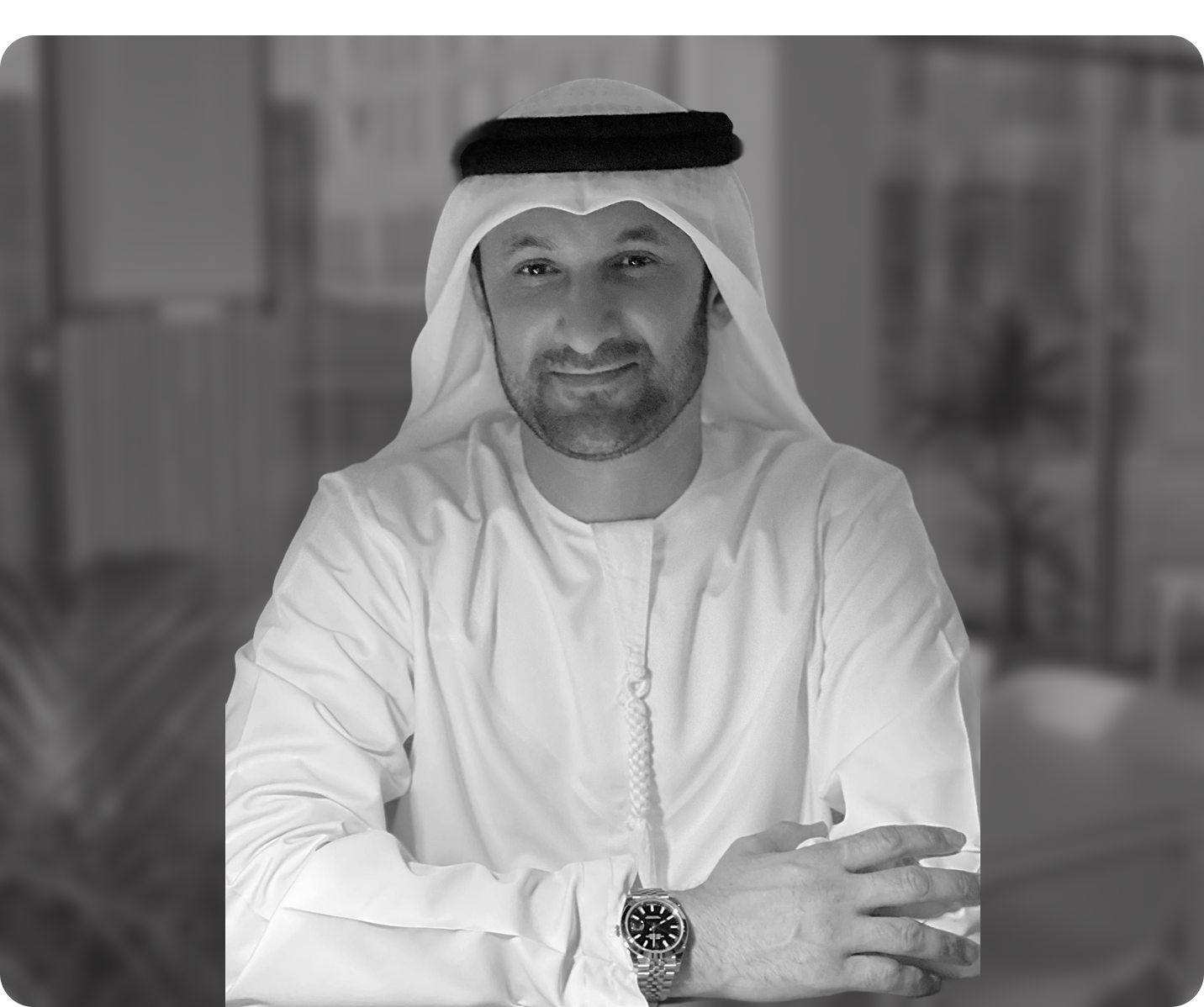
Ahmed Alqaseer
Director — Mentis HR Consultancy LLC (UAE)
Ahmed Alqaseer is a human-capital and organizational effectiveness leader with deep experience spanning public safety and the private sector. As Director at Mentis HR Consultancy LLC in the UAE, he partners with senior executives to design and deliver competency-based talent solutions, leadership assessment and development, and change programs aligned to strategy. Ahmed is known for a calm, outcomes-focused style, strong stakeholder engagement across Arabic and English-speaking environments, and a track record of building high-trust teams that execute.
Earlier in his career, Ahmed served in the Sharjah Police, rising through the ranks to Colonel. Across operational and leadership postings, he led multidisciplinary units, developed officers, and introduced process improvements that enhanced service quality and community outcomes. This frontline-to-boardroom perspective now informs his advisory work—particularly in leadership pipelines, workforce capability, and governance.
Education
Doctorate in Business Administration (DBA), University of Derby, United Kingdom — in progress
Ahmed is currently completing a DBA at the University of Derby, focusing on evidence-based management and the application of practitioner research to organizational performance. His doctoral work strengthens his capability to translate rigorous inquiry into actionable people strategy—spanning leadership development, performance management, and culture change—while evaluating interventions for measurable impact and sustainability.
Earlier in his career, Ahmed served in the Sharjah Police, rising through the ranks to Colonel. Across operational and leadership postings, he led multidisciplinary units, developed officers, and introduced process improvements that enhanced service quality and community outcomes. This frontline-to-boardroom perspective now informs his advisory work—particularly in leadership pipelines, workforce capability, and governance.
Education
Doctorate in Business Administration (DBA), University of Derby, United Kingdom — in progress
Ahmed is currently completing a DBA at the University of Derby, focusing on evidence-based management and the application of practitioner research to organizational performance. His doctoral work strengthens his capability to translate rigorous inquiry into actionable people strategy—spanning leadership development, performance management, and culture change—while evaluating interventions for measurable impact and sustainability.
Certifications & Professional Training
- Hogan Assessments (Advanced Practitioner): Advanced training in the interpretation and administration of Hogan Personality Profiles (HPI, HDS, MVPI), including workshops led by Dr. Robert Hogan in the United States.
- Mentis Navigator Suite: Certified in Mentis assessment and development tools and systems (e.g., Competency Navigator 90/180/360, OCEANS Personality Navigator, SONAR network analytics), applying these to end-to-end evaluation and leadership development programs.
Areas of Expertise
- Leadership assessment & development (competency frameworks, 90/180/360 feedback)
- Talent strategy & workforce planning
- Organizational design, governance & operating model change
- Learning journeys, coaching, and mentoring for emerging and senior leaders
- Stakeholder engagement, community partnership, and public-sector transformation
Professional Highlights
- Director-level advisory across UAE organizations in government, infrastructure, and services
- Command-level leadership experience (Colonel) in Sharjah Police
- Bilingual communicator (Arabic/English) with strong cross-cultural fluency

Bruce Hancock
Principal Consultant
Bruce Hancock is a Principal Consultant at Mentis, where he has partnered with organizations since 2013 to drive leadership performance, cultural transformation, and executive development across hospitality, manufacturing, wellness, FMCG, retail, R&D, and NGO sectors. As a certified practitioner in Mentis Insight Tools and Systems—including OCEANS Personality Navigator, Competency Navigator Multisource Feedback (90/180/360), and Mentis Talent Journeys—Bruce integrates performance psychology with practical coaching approaches that accelerate growth, collaboration, and leadership impact.
Originally from New Zealand, Bruce brings over 30 years of international experience spanning Asia, Australia, the Middle East, and Europe. His career includes senior leadership roles such as Director of Health and Wellness at Chiva-Som International Health Resort and Director positions at Banyan Resort and Asian Oasis. He partners with leaders and teams to design transformative experiences that enhance strategic outcomes, build high-performing cultures, and strengthen executive presence.
Bruce’s consulting approach blends applied psychology, experiential facilitation, and performance coaching, often leveraging storytelling and improvisation techniques to deepen engagement and behavioral change. His clients include Saudia Airlines, Mobily, Daman Health, the Qi Group, Nawal, Banyan Resort, and leading regional universities. Additionally, he founded Naruna, a platform delivering bespoke leadership retreats for leaders seeking clarity, purpose, and lasting impact.
Originally from New Zealand, Bruce brings over 30 years of international experience spanning Asia, Australia, the Middle East, and Europe. His career includes senior leadership roles such as Director of Health and Wellness at Chiva-Som International Health Resort and Director positions at Banyan Resort and Asian Oasis. He partners with leaders and teams to design transformative experiences that enhance strategic outcomes, build high-performing cultures, and strengthen executive presence.
Bruce’s consulting approach blends applied psychology, experiential facilitation, and performance coaching, often leveraging storytelling and improvisation techniques to deepen engagement and behavioral change. His clients include Saudia Airlines, Mobily, Daman Health, the Qi Group, Nawal, Banyan Resort, and leading regional universities. Additionally, he founded Naruna, a platform delivering bespoke leadership retreats for leaders seeking clarity, purpose, and lasting impact.
Areas of Expertise
- Leadership & Executive Coaching: Individual and team interventions fostering authentic leadership, accountability, and psychological flexibility.
- Feedback & Development Journeys: Integrates OCEANS, Hogan, and Mentis tools to translate insights into measurable growth.
- Culture & Engagement: Aligns leadership behaviors with organizational values through workshops, retreats, and blended learning programs.
- Psychological Safety & Wellbeing: Promotes resilience, trust, and emotional intelligence in leadership teams.
- Cross-Cultural Facilitation: Applies global experience to help diverse teams collaborate effectively.
Approach & Philosophy
Bruce combines science-based frameworks with a human-centered approach, helping leaders translate complex feedback into actionable behavioral change. His work emphasizes clarity, purpose, and sustainable performance, ensuring measurable business and cultural outcomes.
Professional Certifications
- Marshall Goldsmith Certified Executive Coach
- Hogan Assessments Certified Practitioner
- Deeper Signals Assessment Certified Practitioner
- Mentis Certified Practitioner – OCEANS Personality Navigator & Competency Navigator Multisource Feedback
- Certified Facilitator and Trainer – Passion Mapping & Values-Based Leadership
Certifications & Credentials
- Marshall Goldsmith Certified Coach
- Performance Psychology Practitioner (Applied Coaching & Development)
- Hogan Assessments Certified Practitioner
- Mentis Certified Practitioner – OCEANS Personality Navigator & Competency Navigator
- Facilitator – Passion Mapping and Values-Based Leadership


